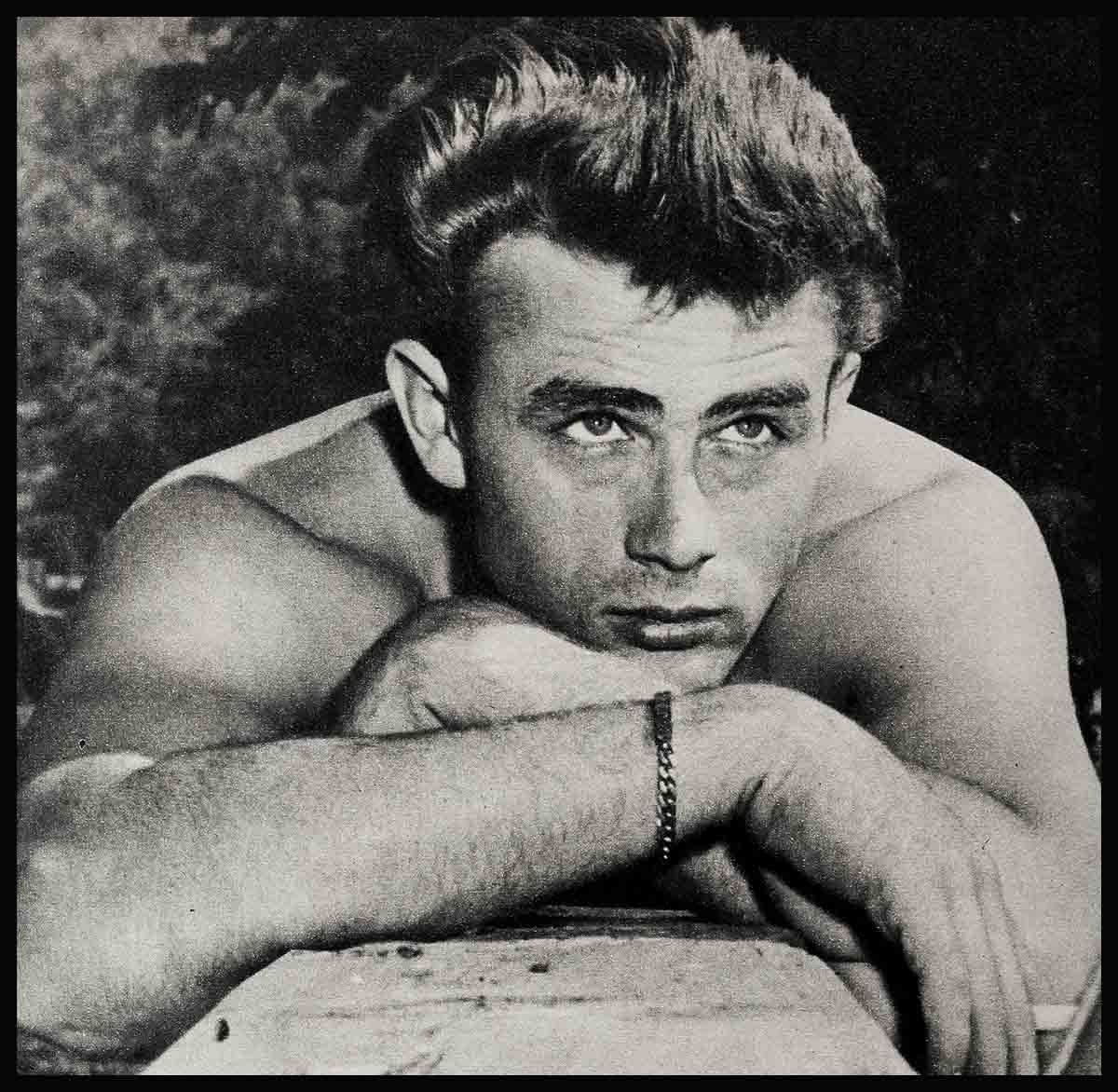
James Dean: Smoldering Dynamite
Six hours after Vic Damone proposed marriage to Pier Angeli a few months ago, that fragile, doe-eyed little Italian creature went out on a date with a twenty-four-year-old actor named James Dean.
“I had a previous appointment with Jim,” Pier recalls, “and it would not have been right for me to break it.”
Pier Angeli is a girl of admirable integrity, and Jimmy Dean has plenty on the ball.
As anyone who has watched his electric performance in East Of Eden will testify, Jimmy has an inexplicable, boyish magnetism, a youngish sex appeal.
One senses latent passion, great depth and seething, smoldering energy, and wonders about a momentary eruption.
After seeing East Of Eden, one critic wrote, “Jimmy Dean is a rare and true genius.” “As fine an actor as Marlon Brando,” wrote another, “maybe better. “The best thing to have hit the screen in years,” attested a third.
And the columnists, not to be outdone, have climbed on the bandwagon. “Jimmy Dean is the greatest.” “A screwball, sure, but what a talent!” “One of the most colorful kids in Hollywood history.” “Of the T-shirt school of actors, probably the best.”
Not since Marlon Brando has any young actor prompted such unanimous praise. And not since Brando has any young actor aroused so much controversy in the movie world.
One group steadfastly maintains that Jimmy Dean is copying Marlon Brando in both his personal and professional life.
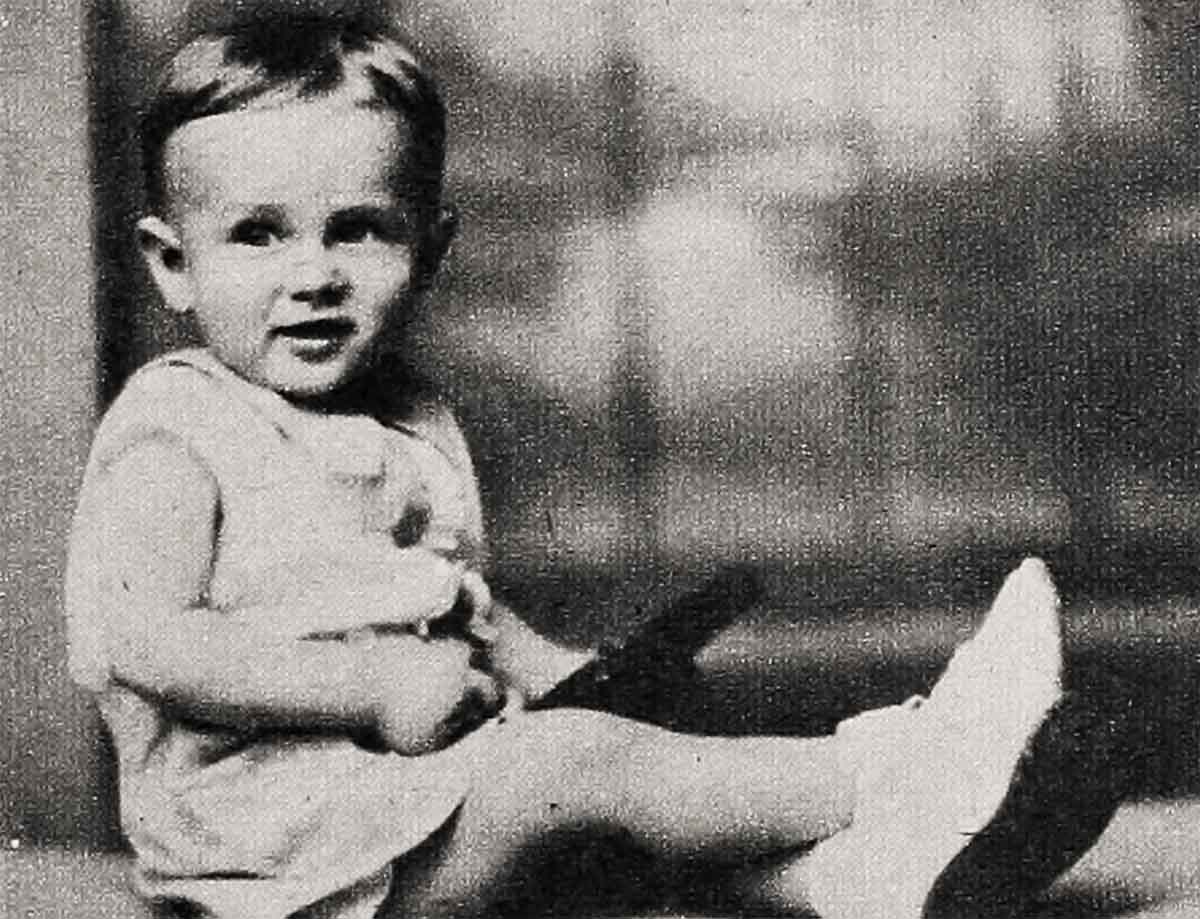
“Marlon Brando has a motorcycle,” one young actress points out, “so Dean buys himself a motorcycle. Marlon Brando plays hide-and-seek with the press, so Dean plays hide-and-seek with the press. Marlon Brando won’t tell anyone about the girls he’s dating, so Dean doesn’t talk, either. He’s a carbon copy of Brando. Absolutely no difference. There’s nothing original about Jimmy Dean.”
A co-ed who dated Jimmy in 1950 when he was attending Santa Monica Junior College, represents those who believe James behaves in the way that is natural for him.
“Jimmy,” she says, “is the most individual young man I ever met. He was the way he is long before Marlon Brando came upon the scene. Everything he does is sincere and heartfelt. It is not calculated for effect.
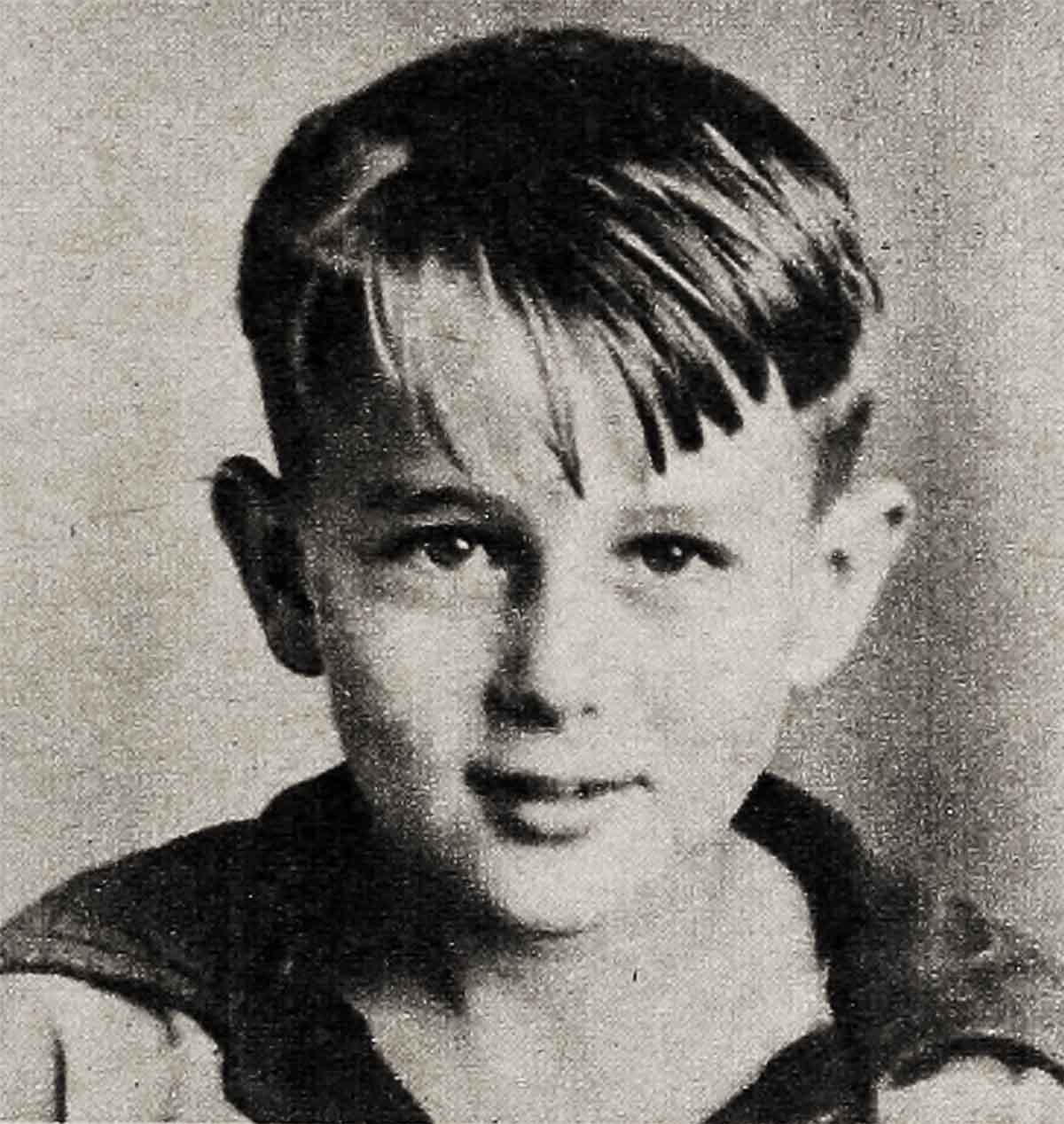
“Unlike Brando, he is not a shocker. He is gentle, sensitive and masculine. Yes, he’s moody and introverted. Sure, he’s a non-conformist but he’s very well brought up. His background is so conservative that he is not likely to defy convention in the brazen way that Brando does.
“I happen to remember when he was going with Pier Angeli. He was stuck on the girl. No doubt about it. When she was at Warners working on a picture, he used to leave the Eden set and watch her every day.
“One day I was out there and Jimmy was photographing Pier. They looked very much in love. And I remember saying to myself, ‘This is the same boy who once told me that he never would get married.’
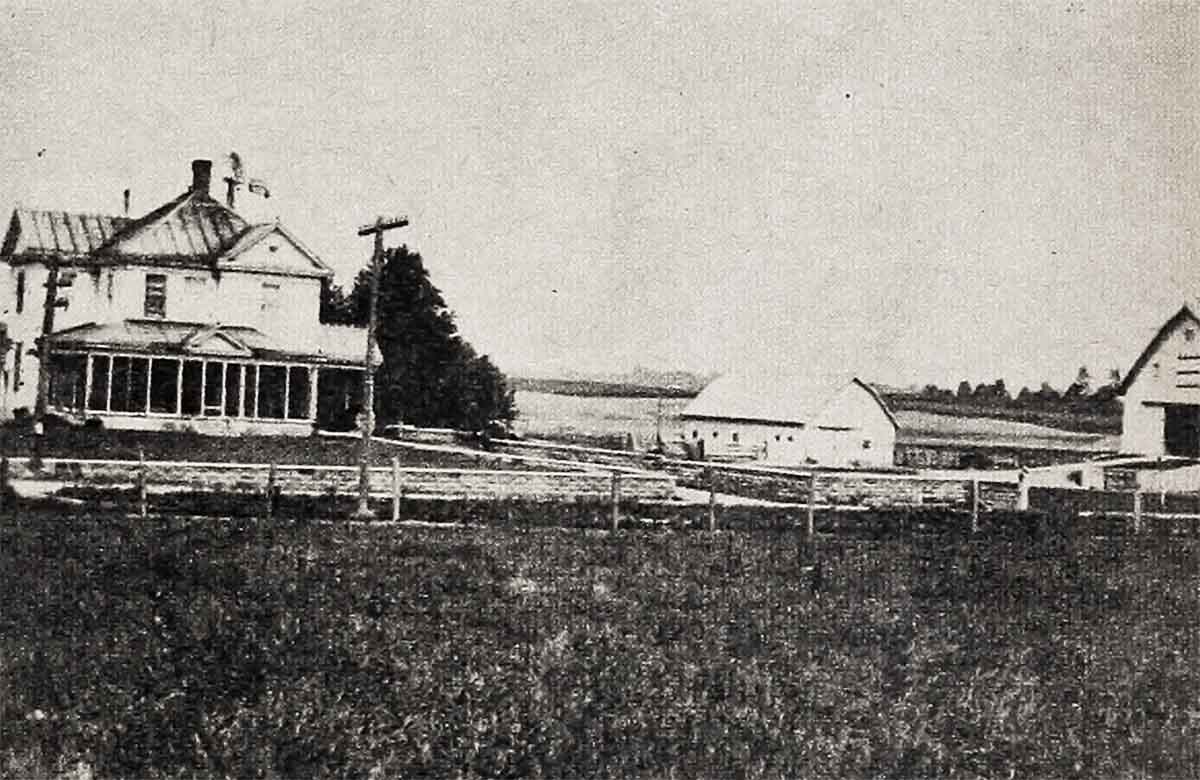
“Anyway, Jimmy took Pier to meet his father and stepmother. His parents live in Los Angeles, and Jim arranged for a lunch at Frascati’s on Wilshire Boulevard. It came off very well.” Now, what could be more conventional than a young man introducing a girl he’s very fond of to his parents?
“They say that Jimmy is a recluse, that he drives around like a madman on a motorcycle, that he refuses to wear anything but a T-shirt and blue jeans. Most of what they say about him is nonsense or exaggerated. Investigate. Ask the people who really know him. They’ll tell you the truth.”
According to his parents, his teachers, his relatives, his colleagues and his friends, James Byron Dean at twenty-four does not fit the Hollywood mold stamped “Typical Young Actor.”
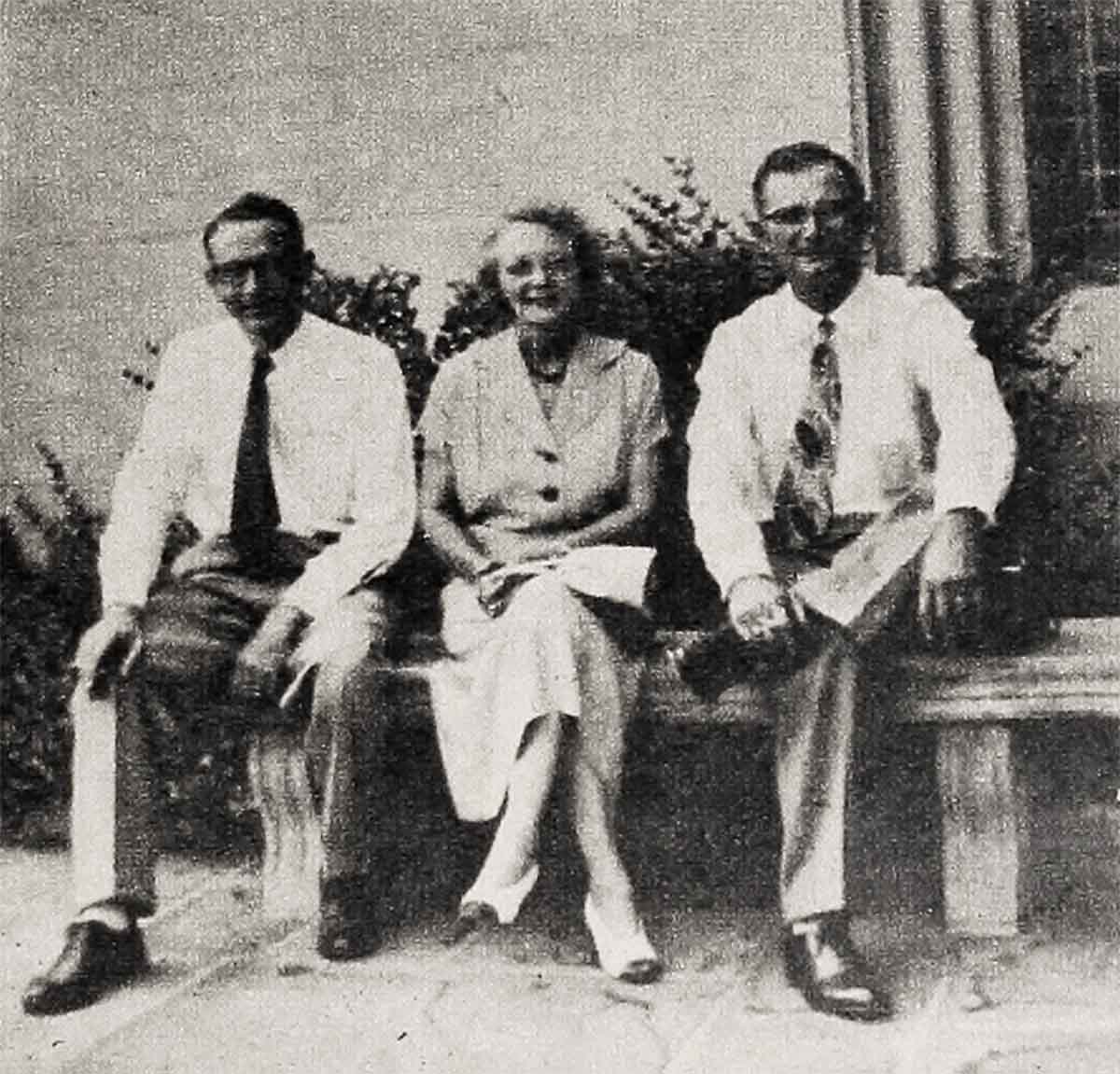
He does not always wear blue jeans and T-shirts. He dresses in black boots, slacks, polo shirts, sports coats, sweaters—any kind of informal wear. He owns more formal clothes but wears them on special occasions. He has always done this.
Jimmy Dean does not “drive around Hollywood like a madman on a motorcycle.” He is the proud owner of a white Porsche convertible, approximate cost $4,000. He takes care of this car with the solicitude of a new mother. Let the motor idle improperly, let one cylinder skip a thrust. Immediately the car is in Jay Chamberlain’s garage across the road from Warner Brothers.
Like most actors he keeps odd hours, staying up until two or three in the morning and sleeping (in shorts) until eleven A.M. or noon.
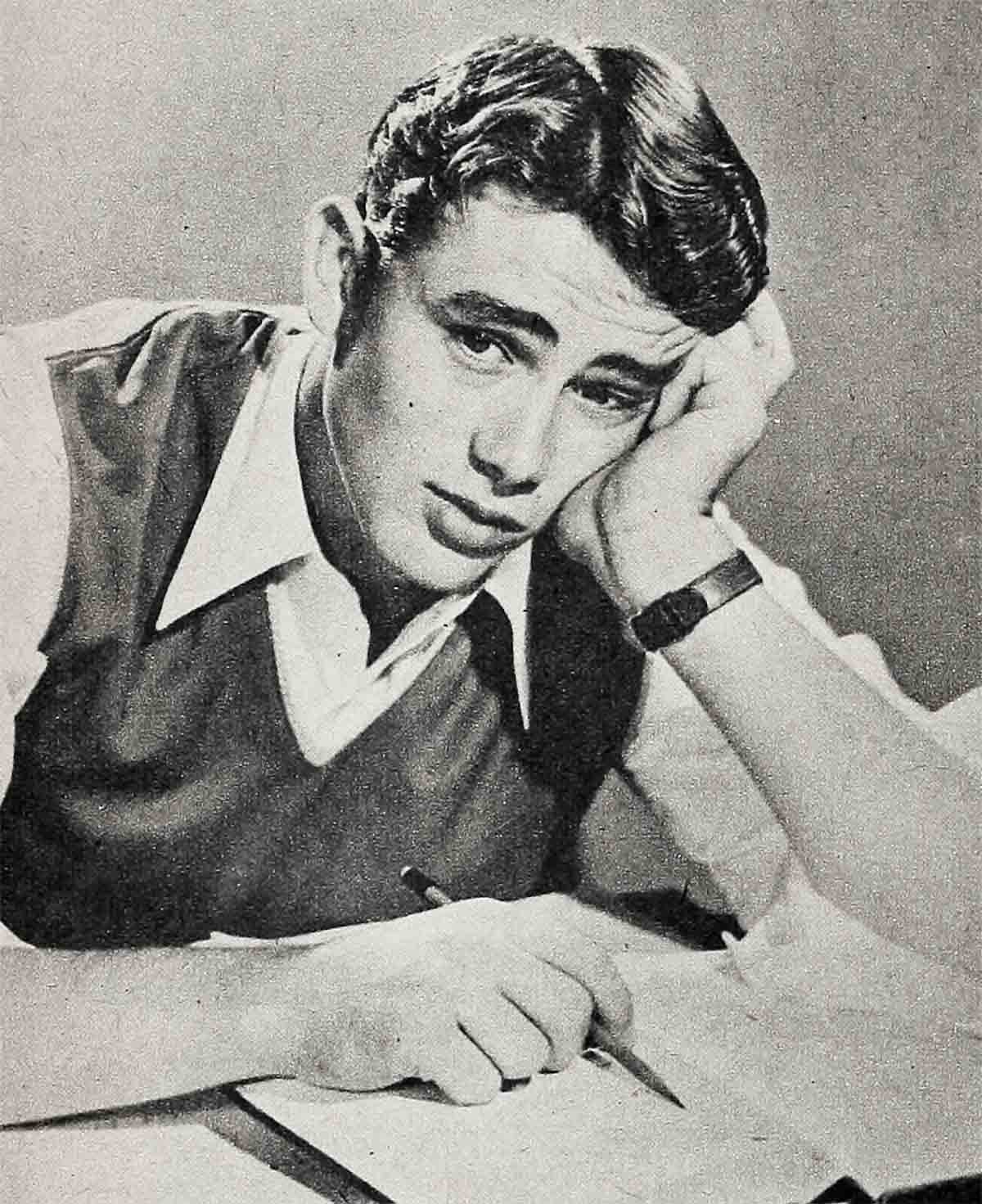
When he’s working, he’s up at six-thirty and always at the studio on time.
Not only does he not look like an actor, but he is unusual in that he cares little for money or publicity. “Just don’t go in for either,” he says. “They don’t interest me. I’ve been without money. And what good is publicity if you don’t have talent? Then you’re just kidding yourself.”
At Warner Brothers, where Dean is under contract for two pictures a year, two pictures he approves of or he won’t play, Jim is described by one spokesman as “a kid who spent his whole life on an Indiana farm, a regular, healthy farm boy with a flair for acting.”
It’s true that Jimmy lived on a farm for nine years, from the time he was nine years old when his mother died in West Los Angeles. His grandmother took him back to Fairmount, Indiana, where the Deans have lived ever since the late eighteenth century. Jim lived there with his Aunt Ortense and Uncle Marcus Winslow until he was graduated from Fairmount High. But in his mental outlook, he is hardly a rural type.
He is a bullfighting enthusiast. He sometimes goes down to Mexico to fight bulls. He studies art, literature and music.
Agriculture and animal husbandry have never interested him.
At Fairmount High School he was a crack basketball guard, an outstanding pole vaulter, one of the greatest debaters in school history. In 1949 he won first place in the National Forensic League contest held at Peru, Indiana. This qualified him for the national contest at Longmont, Colorado, where he recited Charles Dickens’ The Madman.
He didn’t win, but in the words of Mrs. Adeline Nall, his high school dramatics teacher, Jim became impressed with “the power of the spoken word before a great audience.”
Unlike Marlon Brando, who recently admitted, “I became an actor through accident,” Jimmy Dean is an actor by design.
All through high school he took part in plays, character parts, roles that were difficult and challenging for a youngster.
When he came out to Santa Monica Junior College in 1949, he majored in Theatre Arts and received fine grades, but his father tried to discourage him.
PHOTOGRAPHED EXCLUSIVELY BY MODERN SCREEN, JIM’S HIGH SCHOOL YEARBOOK, THE BLACK AND GOLD SHOWS HIM AS ACTOR, ORATOR, ATHLETE, LEADER!
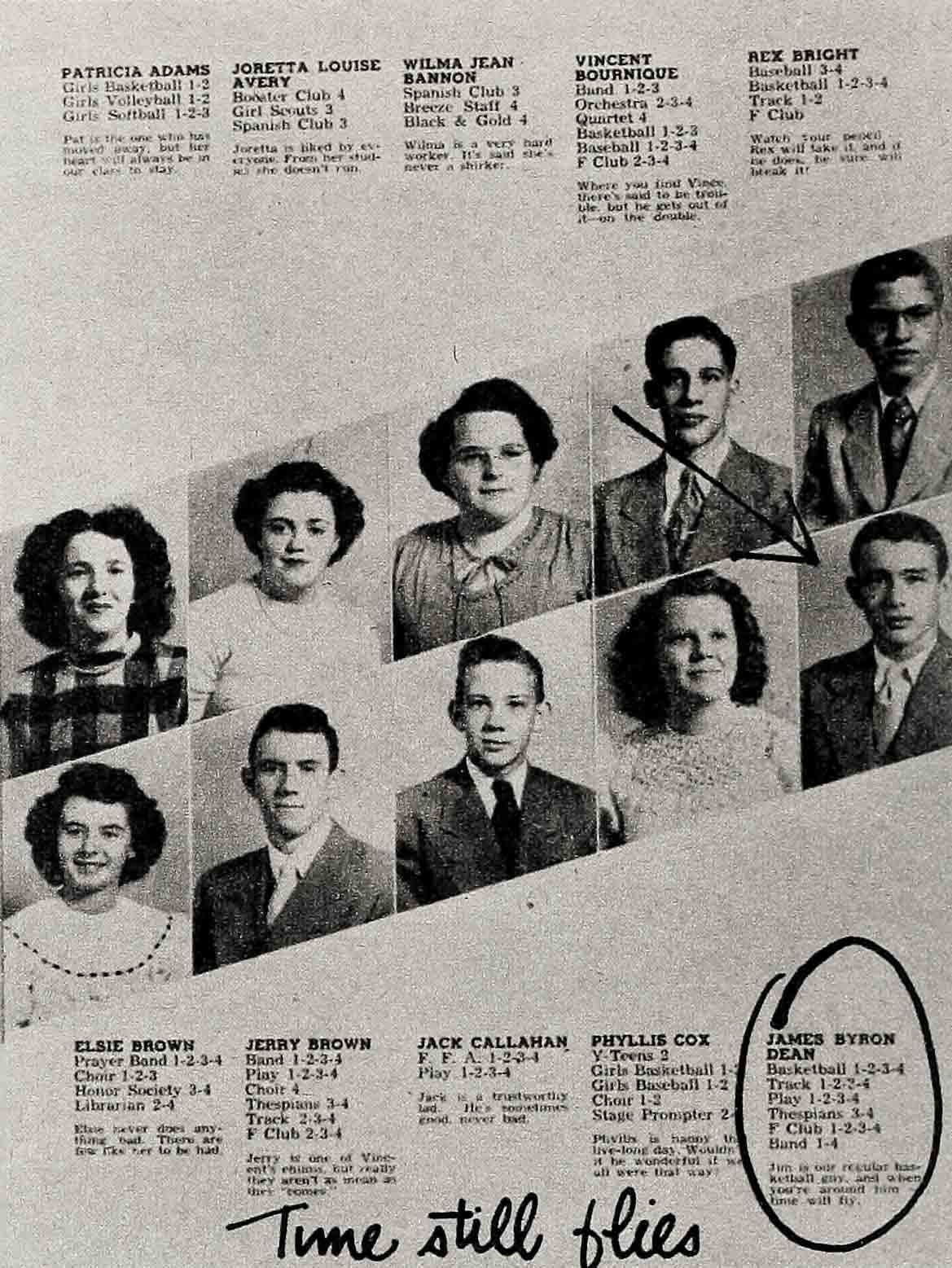
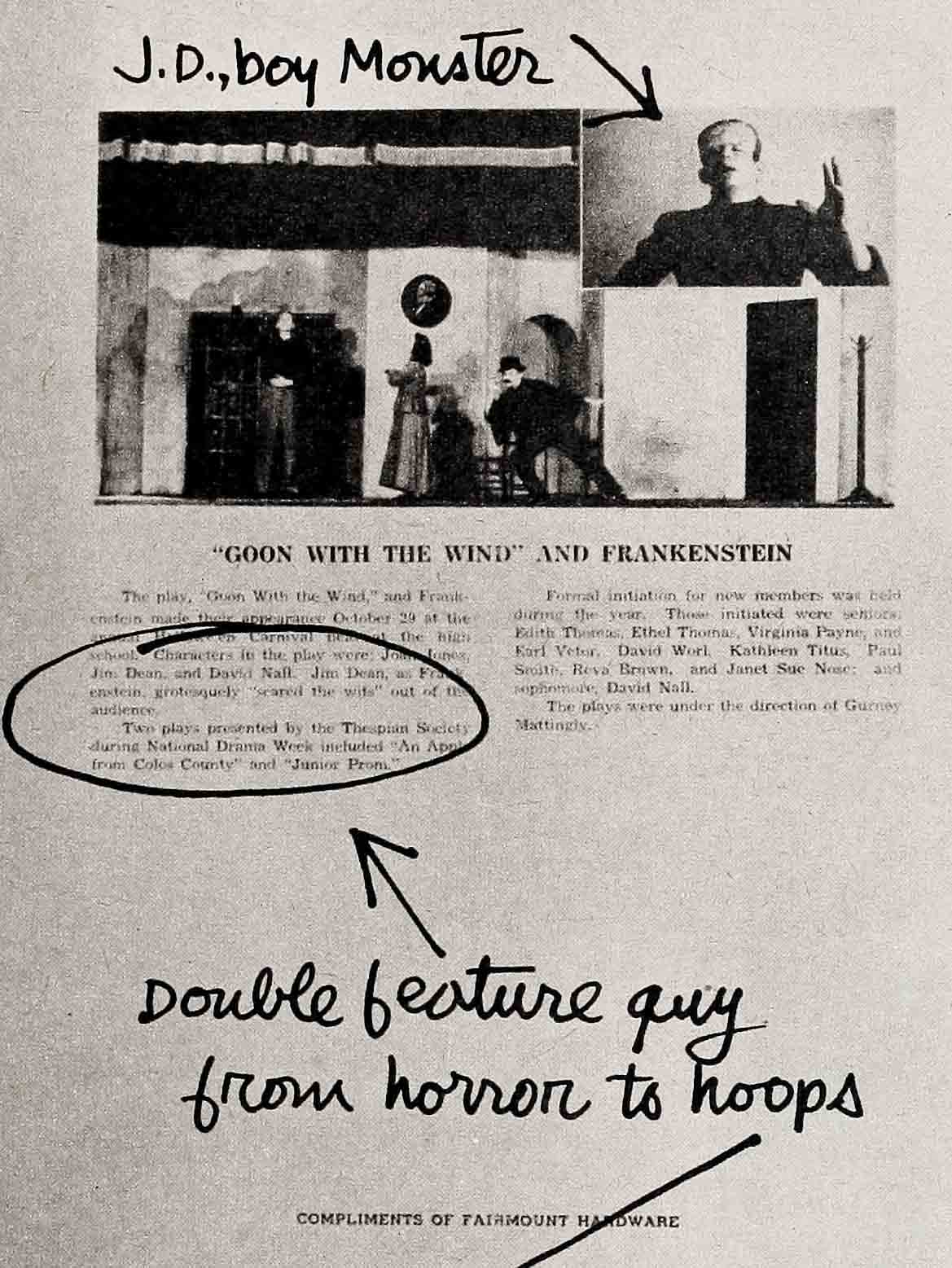
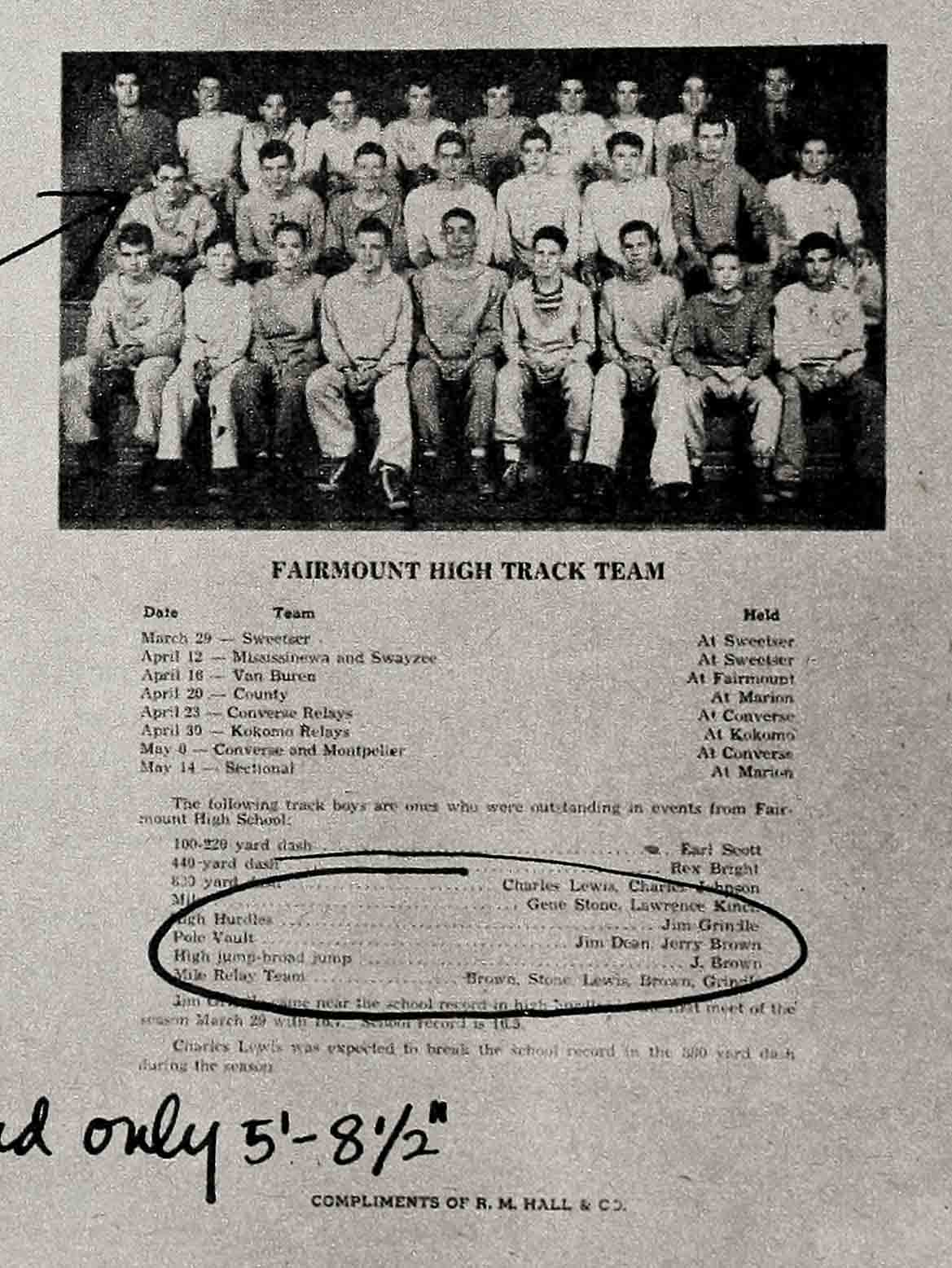
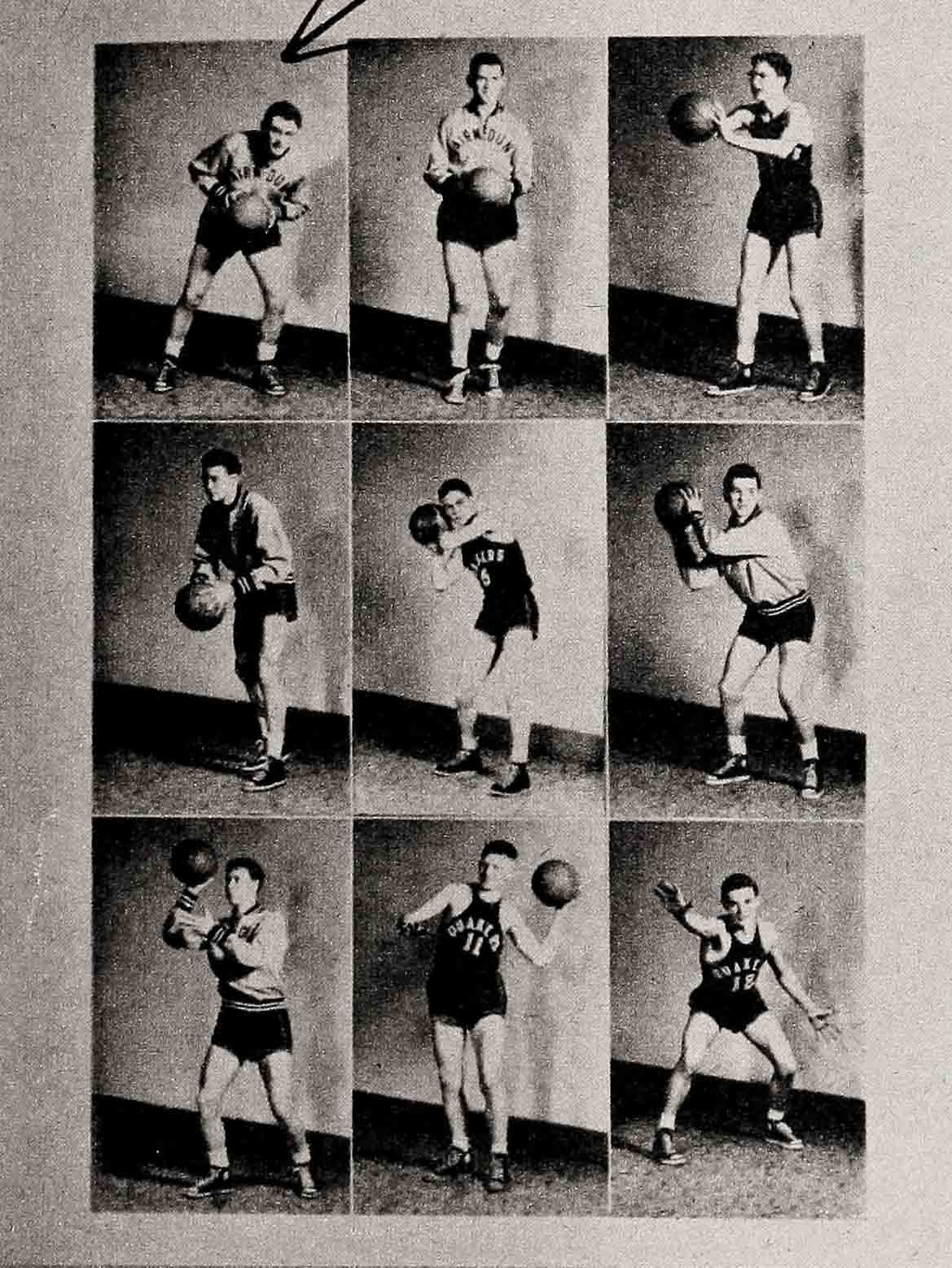
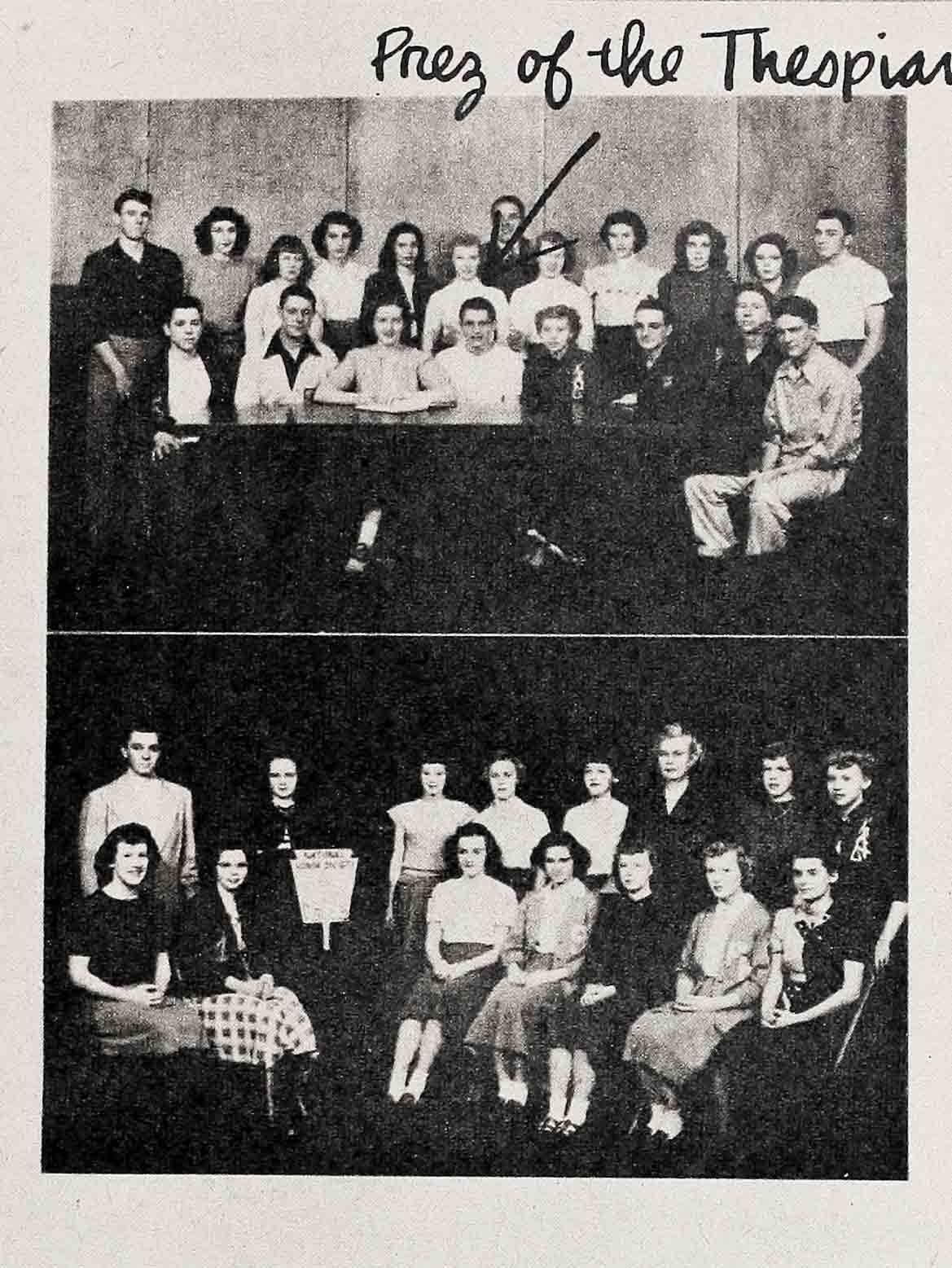
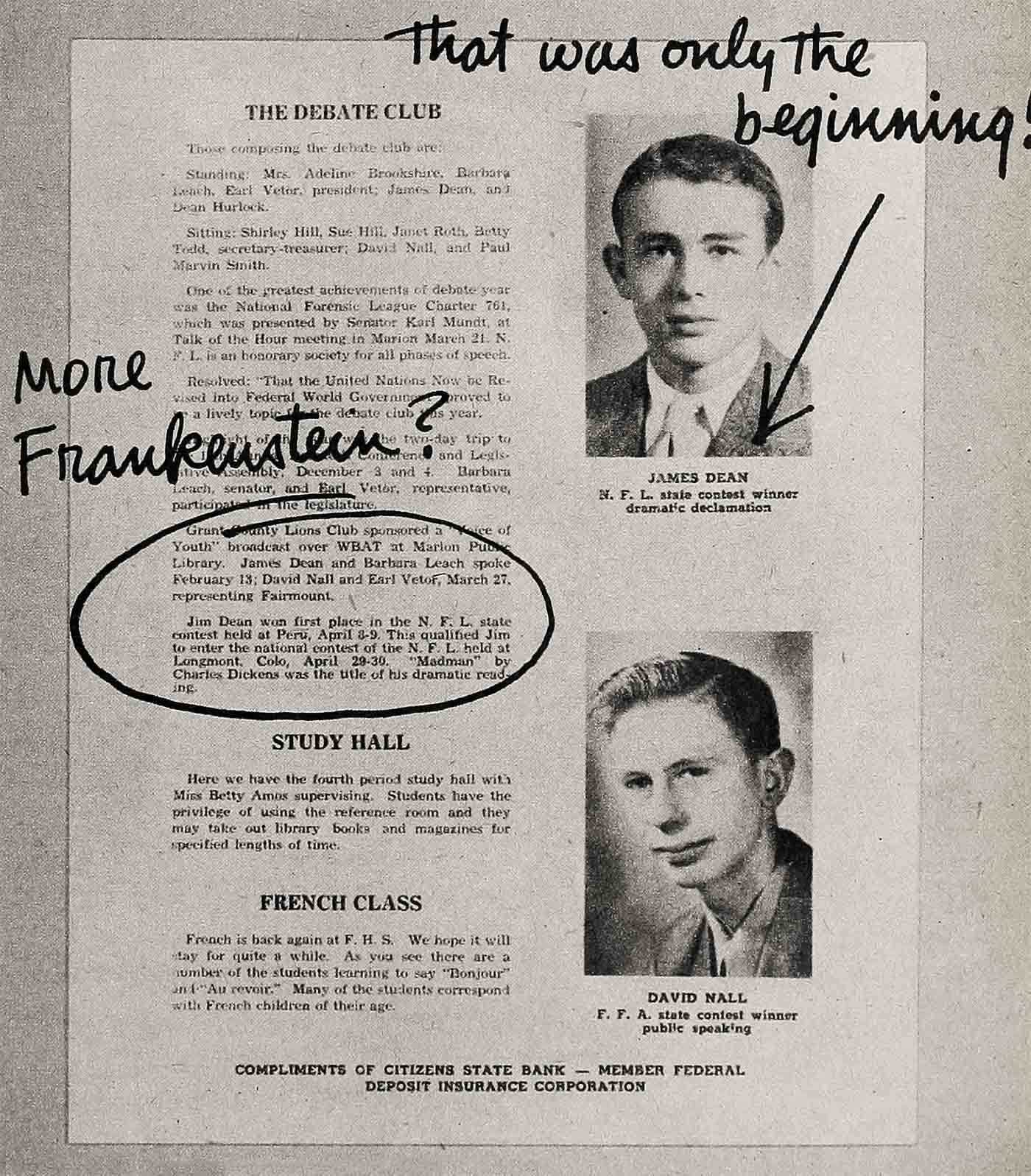
Winton Dean reasoned, “Suppose you do have dramatic ability? Will you be happy living an actor’s life? Why don’t you study law? Your acting will come in handy.”
But Jimmy Dean has determination. Ortense—he calls her “Mom”—will agree.
“When Jimmy makes up his mind to do something,” Mrs. Winslow affirms, “nothing stands in his way.”
“I can’t tell you,” says Mrs. Jean Owen who taught him dramatics at Santa Monica, “what an intense student Jimmy was. He worked on his voice. He studied Shakespeare. He did an awful lot of radio work. His whole approach to acting was intense and dedicated. He learned the rudiments. I remember one time he made-up another student to look like Lincoln.
“The make-up job was absolutely masterful. It had required excitement and imagination. Those are the two qualities that characterize Jimmy—excitement and imagination. His approach to problems is unusual. He plunges in head first. I think he was the same way at U.C.L.A.”
At the University of California in 1950 Jim again was a Theatre Arts Major.
An instructor who remembers him, claims that, “Dean was an uncommunicative character who seemed to live within himself. He spoke infrequently but when he had something to say, he said it clearly and forcefully. James Whitmore, the burly, broad-shouldered actor who was under contract to MGM was the first, I believe, who spoke to Dean about going to New York and getting experience on the stage.”
Dean says that his legal residence is New York City. “I like it there,” he says. “I have an apartment in Manhattan. Very stimulating place. People leave you alone. Hollywood is okay. But for my taste, my whims, I go for New York.”
New York, however, did not go for Jimmy Dean when he arrived there by bus from California a few years ago. The first few weeks the city awed him, and he spent most of his time “watching three cheap movies a day.”
He eked out a bare living from odd jobs, but Broadway would have none of him. Neither would the Army, because of his near-sightedness which requires him to wear glasses nearly all the time.
Jim could have wired for money from his father in Santa Monica or his “Mom” in Fairmount, but it is indicative of his independence and self-reliance that he refused to do so.
Instead, he talked himself into a crewman’s job on a sloop cruising the Atlantic seaboard. To the skipper he confided his acting ambitions, and as luck would have it, the skipper knew a friend who knew a friend. James Dean wound up in the east of See The Jaguar, a Broadway play written by Richard Nash.
Unfortunately, the play ran less than a week. But Jimmy had an opportunity to show his stuff. And the ability he demonstrated was good enough for him to win a role as a blackmailing Arab in Billy Rose’s production of The Immoralist. He appeared on television at CBS and NBC, in such shows as Studio One, You Are There and Television Playhouse.
Last year Elia Kazan, the director who had discovered Marlon Brando, asked Dean if he would be interested in going to Hollywood for East Of Eden.
Jimmy jumped at the chance. He came west and rented a tiny apartment over a garage in the Hollywood Hills.
He had no time for his father, his stepmother, any of the friends he had made at Santa Monica or U.C.L.A. In 1954 it was nothing but work, and he loved every minute of it.
While East Of Eden was in production, Jim fell in love with Pier Angeli, who was acting two sound stages away in The Silver Chalice.
He will not talk about Anna (all her friends call Pier Angeli by her real name) now that she’s married to Vie Damone. But before Anna’s surprise marriage, Jim spoke of her “wonderful soul and her soulful eyes and her overwhelming beauty.”
He tried to spend every spare moment with Anna, and she with him. One afternoon he was chatting with her in her dressing room when her mother came in. Jim took off like a jet.
Jim’s father is a Quaker and his mother was a Methodist. Mrs. Pierangeli always wanted Anna to marry “a good Catholic boy.” And Vic Damone came along.
Before Vic, Jimmy Dean had been sure he had the inside track with twenty-one-year-old Anna. When she drove him to the Los Angeles airport one night several months ago, he hadn’t the slightest idea that when he returned from New York she would be engaged to Vic Damone.
Jimmy Dean likes “plain girls.” He doesn’t go in for actresses. Anna seemed different to him from most actresses, more sincere, more artistic, more open-hearted.
At the moment, however, he is carrying no torch. Industriously he is studying the script of Giant, his next picture, in which he will star opposite Elizabeth Taylor and Rock Hudson. Next he is scheduled for Rebel Without Cause, a psychiatric case study.
Now that he has achieved a measure of fame, people who scarcely knew Dean a few years ago have become authorities on his life. For example, Dean was once a fraternity pledge on the U.C.L.A. campus. He left by request. “I just didn’t have the dough.” But quite a few of his so-called pals don’t remember those days and refer to him as “one of my buddies.”
There are several authorities on the life of Jimmy Dean, and two of the most prominently honest and factual are the delightful couple who raised him, Mr. and Mrs. Marcus Winslow, whose prosperous farm is located on the Jonesboro Road, three miles north of Fairmount, Indiana.
Mrs. Winslow, Ortense Dean before her marriage, is Jimmy’s aunt. He regards her as his mother. His uncle, Marcus Winslow, he calls “Mark.” Their two children, Joan and Marcus, Jr., he thinks of as his stepbrother and stepsister. This is his family, and he loves each one, though he does not speak about it often.
Apparently he has always been like that. When he was five and six, and his real mother would try to fondle him, Jim would always say, “That’s for sissies.”
James Byron Dean was born in Marion, Indiana, on February 8, 1931. His father is a tall, thin, bespectacled, sandy-haired, blue-eyed dental technician named Winton A. Dean.
The Deans have lived in and around Marion for more than 200 years. Jimmy’s grandfather, Charles Dean, seventy -five, and his grandma, Emma, seventy-two, still live in Fairmount, a farm town of 3,000.
Jimmy’s mother was Mildred Wilson, a short, slender, dark-haired farmer’s daughter from Gas City, Indiana.
She and Winton Dean were married in Marion in a civil ceremony early in 1930. The following February Jim was born in a small apartment on West Washington Street. His father was a dental technician in a Veterans Administration Hospital.
The Deans came out to West Los Angeles in 1936. Winton was transferred to the Veterans Hospital out there.
An only child, little Jimmy was enrolled in the Brentwood Grade School on Bunday Avenue. In 1940 Jimmy’s mother, not yet thirty, died of an incurable disease. Jim’s father knew that death was coming, and he tried to prepare his son for it. “But it was very difficult for me,” he recalls. “I just couldn’t get through to the boy.”
Jim went back to Indiana with his grandma Emma. His father asked his sister if she and her husband would look after his son. The Winslows said they would be only too happy.
They have brought him up as their own boy. They take great pride in his achievements and his rise to fame.
They recall that, “He got straight A’s in art all through school and was given violin lessons but wouldn’t practice. Now he could kick himself around the block because he didn’t.”
Dean himself says, “I enjoyed a pretty normal youth as a boy in Indiana, although my father remained in California, working.” Since 1941 the American farmer has enjoyed a fair degree of prosperity. There was always enough money in the Winslow household. As a youngster Jimmy Dean did not have to pinch pennies.
One of his schoolmates at the West Ward Grade School in Fairmount recalls, “Mark Winslow always did well with his wheat and corn and livestock.”
The farmhouse Jimmy Dean was raised in is old, big, white, roomy, well-furnished and comfortable. His foster parents are Quakers who are well-liked and respected.
As a matter of fact, Fairmount these days, basks in a good deal of glory reflected from James Dean’s success. He is the local boy who made good, and nowhere in that small, clean town can you find anyone who will say a harsh word about him. The kids from Fairmount High are thrilled by his accomplishments. His former classmates remember him fondly as “an all-around guy, an outstanding athlete.” His school teachers say with pride, “He was always blessed with the spark of brilliance. All he needed was application.”
A few months ago, Jim came back to Fairmount with a photographer, and the town buzzed with excitement. Jim couldn’t understand why the kids at the drug store stared at him or why he was stared at when he attended a high school dance.
He considers himself no celebrity, “only an actor trying to learn, trying to do my best.”
Eventually, he plans to direct. Sensible and intelligent, he realizes that he has a great job in trying to maintain the acting level he established in East Of Eden. He realizes, too, that he has now become a target for the envious and cynical. And for the columnists who want every crumb of personal information.
To these inquisitors, Jimmy is always out. He keeps his phone number a secret. He is also chary of interviewers. A Warner Brothers publicity man recently explained, “He’s hard to figure out. Some people he’ll see and others he won’t. He’s one kid you can’t figure. The only concessions he will make are to his own conscience. He is determined to live his life in his own way—not according to the rules of a young actor’s conduct as prescribed by Hollywood.”
THE END
—BY LAURA OWEN MILLER AND ANNA KENDAL
It is a quote. MODERN SCREEN MAGAZINE JUNE 1955




